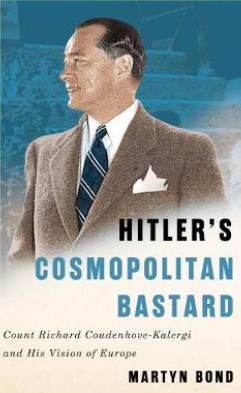Book Review by Brendan Donnelly, Director of The Federal Trust, of “Hitler’s Cosmopolitan Bastard” by Dr Martyn Bond
Martyn Bond’s fascinating biography of Count Richard Coudenhove-Kalergi (RCK) can be read and enjoyed on a number of levels, as a biography of its subject, as a history of European politics from the First World War until the 1970s and as an analysis of the cross-currents shaping the birth of today’s European Union. It is a highly successful enterprise on all three levels.
Martyn Bond rightly stresses the contrast between the prominence accorded to RCK in continental European memory and his low level of recognition in the United Kingdom. Described by the editor of Le Monde as the “grandfather of Europe,” RCK is often overlooked even by the pro-European wing of British public and political opinion. Monnet, Schuman and even Spinelli are names, mentioned either for praise or obloquy, much more likely to figure in the British debate on Europe than RCK’s. This biography goes a long way to explaining why.
Although he ended up favouring British membership of the European Community in the 1960s, for nearly fifty years RCK was suspicious of the role the United Kingdom was playing or might play in the building of a United Europe. Particularly in the 1930s and 1940s he feared that the pull of the Empire and Commonwealth would always lessen British commitment to European integration. The UK might even seek to retard the integration of its neighbours by seeking to establish looser, alternative European political structures. This well-founded apprehension of RCK’s led to a reciprocal suspicion from British official and political circles, by which he was often regarded in predictably patronising terms as a “dreamer.” RCK would probably not have rejected such a description. He might however have pointed out that in addition to being a “dreamer” he was also a talented organiser and supremely effective lobbyist for the European cause. In the 1920s and 1930s particularly he created and sustained from nothing the continent-wide Paneuropean Union that counted many of the leading politicians and intellectuals of the day among its supporters. RCK might also have mentioned that many more of his “dreams” were realised even in his lifetime than of those of the British officials and politicians who wished the UK to stand aside from Europe in the interests of an imperial role or Commonwealth preference.
Although he was an early prophet of European integration, RCK was half Japanese, and his commitment to European unity was always based upon an underlying universalism. The son of an Austro-Hungarian diplomat, he was convinced of the damaging pointlessness of European nationalisms by the First World War and devoted the rest of his life to advocating a United States of Europe, the citizens of which would have a common passport, a common currency and a common flag. He foresaw a world of competing or co-operating regional blocks, of which Europe needed to be one. It is a paradoxical tribute to the effectiveness of his evangelisation in the 1920s and 1930s that Hitler described him as a “cosmopolitan bastard,” recognising in RCK the consummate representative of the internationalism which Hitler so despised.
Martyn Bond’s biography of RCK moves effortlessly between the personal details of RCK’s varied and adventurous life, in which he was married three times, served as a role model for a character in the film “Casablanca”, twice narrowly escaped capture by the Gestapo, lived in half a dozen different countries and was nominated on a number of occasions for the Nobel Peace Prize; and the wider political context against which RCK’s work must be placed in order to be understood. Although RCK was always a vigorous anti-Nazi, he was for too long prepared to give Mussolini the benefit of the doubt; as a younger man he had his doubts about mass democracy; and he was close to the quasi-Fascist Austrian Chancellor, Dollfuss. It is easier looking back on the tempestuous 1930s to avoid in retrospect the pitfalls into which people of good will and intelligence sometimes fell, even if temporarily. RCK was always a firm believer in Parliamentary democracy. This common thread ran throughout his activities before and after the Second World War, with Parliamentarians from the widest range of European states forming the political underpinning of the European Parliamentary Union he set up after the Second World War.
For me, the most interesting section of the book was its final chapters, describing the uneasy relationship between RCK and Monnet after the Second World War. The two men seem to have been on polite personal terms, but incorporated in themselves and their political action two very different approaches to the goal of European integration. Monnet’s approach was gradualistic and institutional, while RCK was impatient of such bureaucratic caution. Like his most prominent supporter in his later years, General de Gaulle, RCK believed primarily in generating political support for grand integrative goals, the details and precise structures of which could later be agreed. Monnet was suspicious of what he regarded as such Utopian thinking. As a businessman and administrator, Monnet believed that the journey towards European integration was as important as the goal, and he sought to facilitate the journey. He was sometimes impatient with RCK’s insistence that the disagreements between the two of them were simply technical in nature. The disagreements went much deeper than that. In the short term, Monnet emerged the victor in the clash of philosophies and the European Union is today substantially constructed along the lines he envisaged. RCK’s shade may well however be deriving some grim amusement from the frequent criticisms of the EU that it is faceless, remote, bureaucratic and soulless. Perhaps naively, he thought of European integration as a project to be generated and sustained primarily by popular and political enthusiasm. RCK would certainly be one of those criticising contemporary European politicians for their reluctance to present the European Union in other than technocratic and transactional terms.
This is an informative and elegant biography of an important figure in recent European history. It illuminates the extraordinary life of its subject and the sometimes murky political circumstances in which he needed to operate. It leaves however open at its end the questions which divided RCK and Monnet in the 1960s. Is Monnet’s “community method” the right, or the best, or the only way to foster European integration? Or can the integrative process only proceed on the basis of bold, over-arching goals agreed and advocated at the political level, with the technocratic implementation of these goals following naturally after the political agreement? Or is the European Union in reality a compromise between the two methods, where ambitious goals such as the euro and the creation of the single market can be set for the Union, but their implementation requires an altogether more sophisticated bureaucratic infrastructure than RCK would have admitted? RCK died in 1972, heaped with honours from pro-European groups and institutions. But the last years of his life and indeed the decades since have seen only a partial realisation of his European aspirations. If Europe is today a power in the world, it is certainly not (yet?) the kind of power RCK and General de Gaulle wished it to be. The term “hard power” was probably not in RCK’s dictionary, but it certainly captures the role he envisaged for Europe as a powerful regional block. Whether the enlarged and disparate European Union of today can equip itself with the tools to project itself as a major global actor is the unresolved question of the next decade.
“Hitler’s Cosmopolitan Bastard” by Martyn Bond was published by McGill-Queens University Press in April 2021
Hardback: £24.99
CLICK HERE FOR MORE INFORMATION FROM THE PUBLISHER
Click here to purchase from:
Bookshop.org







Leave A Comment